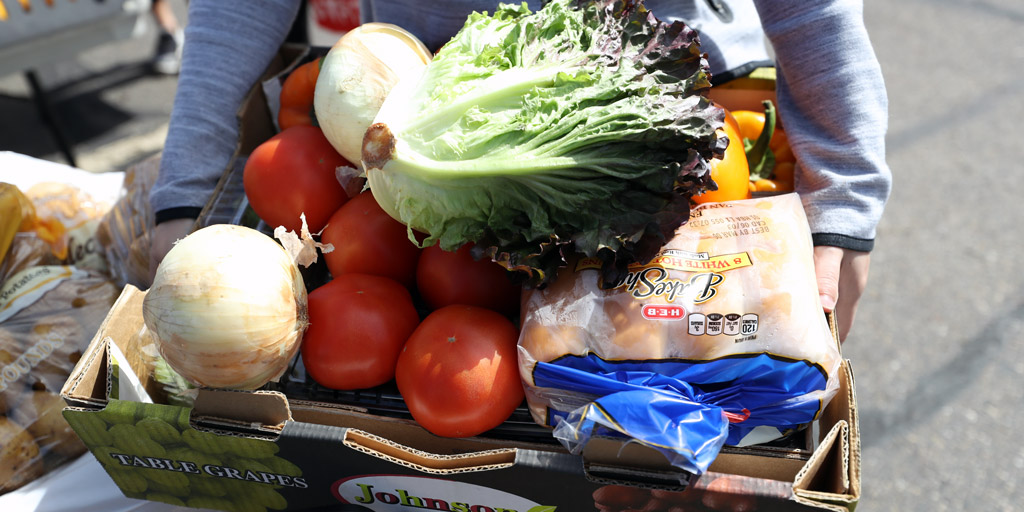4 ways Baylor is fighting hunger and food insecurity

When you think of world hunger, what comes to mind? Most likely, it’s an image of someone living on the streets or in a foreign country, relying on soup kitchens, perhaps with an emaciated body and distended belly. While imagery like that can be powerful and compelling, it’s important to remember that it’s not the only kind of hunger that exists.
More than 42 million people in the U.S. are food insecure, meaning they lack reliable access to affordable, quality food. More than 4 million Texans are food insecure, including nearly 1 out of every 4 children. It’s felt by some of our own neighbors, here in Waco and even on campus. Here are four ways Baylor is working to “love thy neighbor” and combat hunger:
The Texas Hunger Initiative:
Baylor’s Texas Hunger Initiative (THI) is a research initiative within the Diana R. Garland School of Social Work. Led by Jeremy Everett, MD ’01, the team works at the federal, state and local levels to bridge the gap between resources that already exist and the people who need them most. That means researching where and for whom food insecurity exists, then addressing that need through policy analysis, education and community organizations.
The goal is to eradicate hunger in Texas, and to do so through a model that can be replicated elsewhere. Already, some 25 other states have consulted with THI on their strategies for implementing programs that help food-insecure Texans get access to healthy meals. That input has established Everett as a leader at both the state and national levels. In 2014, the National Commission on Hunger was formed to assist Congress in the fight against food insecurity nationwide — a committee that included Everett as one of the commission’s 10 members.
Campus Kitchen:
Founded in 2008, Campus Kitchen at Baylor University (CKBU) is a student-led organization that works to minimize food waste and alleviate hunger in the Waco community. Like THI, they work alongside other organizations and individuals to figure out the best ways to make a difference in the fight against hunger and food insecurity. That includes recovering thousands of pounds of untouched food a year from Baylor’s on-campus dining halls, as well as growing fruits and vegetables in the on-campus community garden. Student volunteers pack up all this food and transport it to local outreach centers, such as the Salvation Army Men’s Center, Caritas food bank, Meals & Wheels and the Shepherd’s Heart Food Pantry.
World Hunger Relief Farm:
Through Baylor Missions, students combat world hunger by volunteering weekly at the World Hunger Relief Farm, “a Christian organization committed to the alleviation of hunger around the world.” The farm grows various fruits and vegetables and raises cows, chickens, goats and more, serving as a learning laboratory where people can learn about sustainable farming practices. The interns that come through the program have gone on to become agricultural missionaries, leaders of anti-hunger nonprofits, and sustainable farmers themselves.
Additionally, twice a week Baylor students harvest, pack and deliver food from the farm to Waco’s Family Health Center. Rather than a prescription for medicine, patients at this clinic are given a list of fruits and vegetables and workouts that would improve their quality of life. Most live in food deserts, where healthy, non-processed foods are not readily available — so students are instead bringing the food to them at no cost. And since following a new workout regimen isn’t always possible without access to the right equipment, the health center provides them access to workout equipment, donated by Baylor.
Student Success Initiatives:
As its name implies, the Paul L. Foster Success Center’s “Student Success Initiatives” office works to support students with specific needs, such as freshman and transfer students, first-generation students, military veterans, etc. Among those in need are students impacted by food insecurity — yes, even at Baylor.
Over the last couple of years, BU professor Nathan Alleman and doctoral candidate Cara Cliburn Allen, MS ’15, have studied the problem here at Baylor and found that about 20% of Baylor students are food insecure. (To be clear, this isn’t only a Baylor problem; universities around the country are fighting similar issues.) In an effort to get that 20% down to zero, over the past year Student Success Initiatives has launched the Mobile Food Pantry, the Free Farmers Market, The Store and The Fridge, all created for the sole purpose of putting free, healthy foods directly into the hands of students.
“World hunger” is such a broad, nebulous issue that it can be difficult to address. But these initiatives are real, tangible ways Baylor is not only getting nutrition to those who need it most, but embracing our entire community.
Sic ’em, hunger-fighting Bears!
You might also like:
* Baylor takes on student hunger with on-campus food pantry (Jan. 2018)
* Meet Baylor’s nationally recognized expert on fighting hunger (Aug. 2017)
* #BearsOfBaylor – “Let’s give it away for free. And, here we are!” (Nov. 2016)

